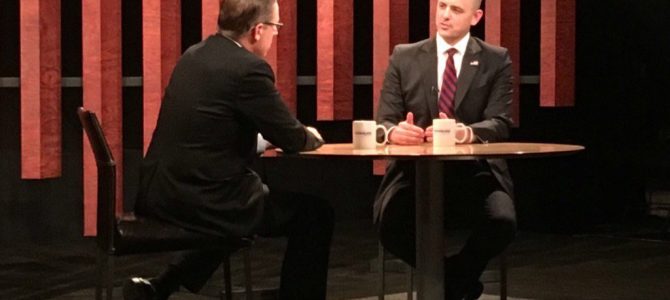
AUSTIN – The day after Ted Cruz endorsed Donald Trump, he sat down for a one-on-one interview in front of a large crowd at the Texas Tribune Festival. It was awkward.
The Tribune’s Evan Smith opened the interview by asking, “What happened to your conscience?” At the Republican National Convention in July, Cruz refused to endorse Trump on the convention stage and instead urged Republicans to “vote your conscience.”
Cruz didn’t have a good answer. He’d come prepared with a full justification for his about-face, and reiterated the six policy differences he’d laid out in his announcement on Friday, the chief one being Trump’s expansion of a list of potential Supreme Court nominees, including Sen. Mike Lee, along with a promise to choose nominees only from this list. For Cruz, this issues trumps all others. If Hillary Clinton is allowed to appoint as many as four new justices, Cruz said, “the court will be lost for a generation.”
The problem, of course, is that this was just as true in July as it is today—nothing has changed. What’s more, Cruz has called Trump a “pathological liar,” which casts doubt on the reliability of Trump’s promises. When Smith noted this, Cruz disagreed, saying Trump’s “public commitment” to the expanded list of nominees was a “meaningful change.”
But as Ilya Somin noted recently at The Washington Post, the problem goes beyond dishonesty. Trump has “a wide-ranging repressive agenda that would undermine the Constitution at many points,” and that agenda comes from views that have long predated the 2016 campaign, including a desire to undermine freedom of speech, property rights, and restraints on executive power.
No matter. Cruz essentially said it was worth the risk because “Hillary has told us what she will do, which leaves me no choice but to vote for Donald Trump.” He also claimed he was damned if he did, damned if he didn’t. “There was no option that wouldn’t have resulted in people being deeply dismayed,” he said.
That’s no doubt true, but Cruz is now coming in for criticism for having done both. To flip a phrase from a past presidential election, Cruz was against Trump before he was for him. That’s what galls people, especially voters who can plainly see that nothing significant has changed about either Trump or Clinton since the national conventions in July. The only thing that’s changed are the polls: Trump might win, which would leave Cruz facing a tough reelection in 2018.
So we’ll hear no more criticism of Trump from Cruz. Pressed on whether he agrees with specific things Trump has said, like Trump’s recent claim that Vladimir Putin is a stronger leader than President Obama, or how, as someone with two young daughters, he could support a candidate that is so openly misogynist, Cruz dodged: “I don’t think it is beneficial for me to criticize the nominee, and if you ask me to do it I will decline.” He repeated that line a few times.
As Ben Domenech noted in these pages on Friday, if Cruz was going to do this, the time to do it would have been back in July, along with the likes Marco Rubio and Paul Ryan. That he chose to wait until the race was neck-and-neck, on the eve of the first presidential debate with only six weeks to go until Election Day, smacks of something less than conscience and promises about the Supreme Court. It smacks of opportunism and a desire, above all, to hold onto his Senate seat.
That stood in stark contrast to another keynote interview at the Texas Tribune Festival this weekend. Evan McMullin, the 40-year-old political novice who last month launched a quixotic campaign for president on an independent ticket, told festival-goers that Trump is a racist, “full stop,” and that Cruz had “betrayed the cause of conservatism” by endorsing him.
McMullin, a former CIA officer and chief policy director of the House Republican Conference, shares with Cruz a penchant for talking about the Constitution, the Declaration of Independence, and the Founding Fathers. Like Cruz, he’s big on political philosophy and conservative principles, and talks about them in a sometimes lecturing tone. In some ways, McMullin has taken on the mantle Cruz discarded.
Unlike Cruz, he’s not too worried about politics. In fact, he says he got into the race by accident. He wanted to help out with a conservative, third-party campaign, maybe as a policy advisor. When he approached some people to ask about it, he was dismayed to learn that no one with national name recognition would agree to run. When they asked him if he’d do it, he was surprised, but agreed because, “someone had to run.”
Asked who are McMullin voters if, as Cruz claims, the election is a binary choice between Clinton and Trump, McMullin replied: “People who are extremely principled, who care deeply about the Constitution, who believe Donald Trump is much like Hillary Clinton. Country before party types.”
He sounded a lot like Cruz back in July.









